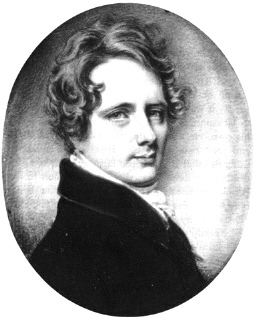Federal Banker

Nicholas Biddle -- born on this day in 1786 in Philadelphia -- led a life of refined leisure before becoming the third president of the Second Bank of the U.S. at age 37. Notably, as a young man he attended the coronation of Napoleon, he was an amateur scientist like his friend Thomas Jefferson, and he was the first to attempt to edit the journals of Lewis and Clark, published as History of the Expedition of Captains Lewis and Clark (1814).
Perhaps to the surprise of his friends, he turned out to be an able administrator of the somewhat unpopular central bank. His loosening of credit, which was credited with improving the economy during the 1825 depression, earned for the bank a measure of respect and improved its public image.
Feeling his power, Biddle attempted to have the charter of the bank renewed by Congress four years before its expiration, but bank-foe Andrew Jackson (who had an irrational mistrust for all banks, let alone a central bank) vetoed the extension and started to pull government deposits out of the bank. Biddle ill-advisedly retaliated against the formidable Jackson by contracting the money supply. Lending rates increased, businesses started to fail, wages dropped and unemployment rose, and meanwhile Jackson's policies forced Biddle to obtain a state charter for the former Bank of the U.S., now known as the United States Bank of Pennsylvania.
Unable to impose wholesale changes in the money supply with his newly-chartered bank, Biddle nevertheless used the bank to form a syndicate to corner the cotton market in order to control prices in an effort to attract foreign credit to the country. The plan worked, and while the nation began to climb out of financial crisis, Biddle's bank cleared a profit of $800,000 on the cotton scheme. Biddle felt that the role of a central bank in averting financial crises was vindicated with his work, and he retired a wealthy man. (His lavish Bucks County estate, Andalusia, which the Biddle family continued to live in until 1972, is now open to the public.)
Within a few years after Biddle's retirement, however, the United States Bank of Pennsylvania went bankrupt after a failed attempt at cornering the market again. Blind to pure politics, Biddle's faith was in disciplined behavior and rationality, and the groundwork he laid for the wisdom of central control for the nation's money supply would ultimately win the day with the creation of the Federal Reserve Bank in 1913; yet for years afterward, Jackson was viewed as a hero for crushing Biddle's bank, and Biddle's central bank, rather than Jackson's policies, was blamed for the U.S. financial decline which occurred from 1837 to 1844.
Biddle died on February 27, 1844.
Categories: Business-&-Finance





2 Comments:
Biddle's, et.al. scheming during this era of American history only serves as further evidence that if the U.S. had a money supply which was governed by the Constitution (gold & silver coin, not greenbacks, fiat dollars, etc.), none of these "boom-bust" cycles would have happened, and, dare I say it, this country would be better off today (little to no debt, no federal deficit, etc). For further study, read G. Edward Griffin's "The Creature From Jeckyl Island."
Biddle was a Central Banking criminal just like all those before him and all those after him. If you really knew how the Republic of the U.S. is supposed to work your blog would read much differently. As it is it is another example of misinformation running rampant on the internet. Be careful what you write...someone may be lazy and actually believe what they read at face value.
Post a Comment
Subscribe to Post Comments [Atom]
<< Home